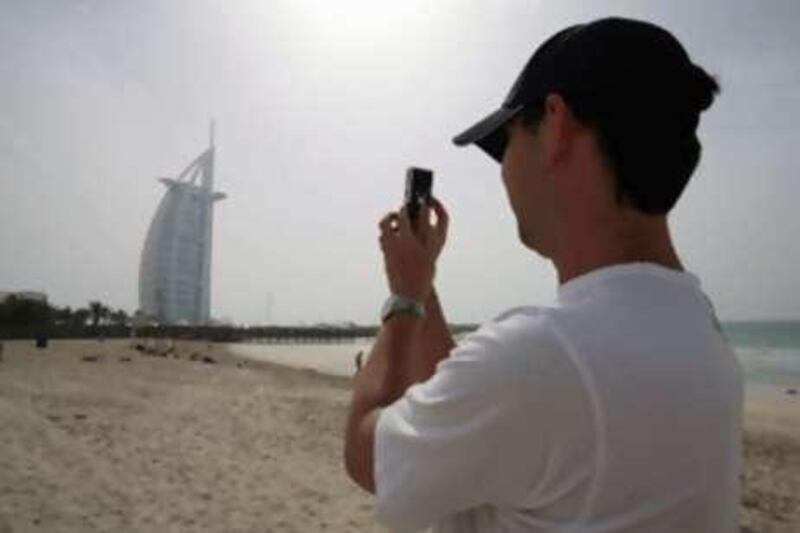Hotel occupancy rates in Dubai have fallen by as much as 25 per cent this month, prompting a bout of heavy discounts. Many middle-market hotels and those that rely on business visitors are experiencing occupancy rates of 70 per cent, down from the high 90s in December last year. "The extended honeymoon is over," said Habib Khan, the chief executive of Planet Group, which owns and manages three mid-level hotels in Dubai. "The group's hotels have been experiencing a 20 to 25 per cent drop in occupancy rates for the month of December." Mr Khan said hotel rates had been reduced to try to stimulate business. "We no longer charge supplement charges, which was the case last year. Rates have been reduced by about Dh100 (US$27.22) a night, bringing the final price of a mid-rage hotel to about Dh500 a night." Last week, the Dubai Department of Tourism and Commerce Marketing (DTCM) urged hotels to reduce their rates by up to 60 per cent and to give a 40 per cent discount on contracted rates for corporate clients. In return, the DTCM will try to generate business for the participating hotels in its promotion for the Dubai Shopping Festival, which will be held between Jan 10 and Feb 15. "It is not an obligation for all hotels. Those who participate in DTCM's promotion will have a chance of getting some business, which is hard to come by for most hotels in Dubai," said Syed Zahid Hussain, the general manager at the Princess Hotel, a three-star property. Mr Khan said his company would not take part in the DTCM programme. "Business is still not that bad for us and I don't want to dilute my rates even further," he said. Four and five-star town hotels have been affected most by the drop in the number of tourists. Beach-front hotels are maintaining higher occupancy levels because most holiday packages were sold earlier this year before the economic slowdown took hold. "Everyone is affected here, no matter what sort of property you operate," said Ashwin Singh, the general manager of Dubai's Dhow Palace Hotel. "It is safe to say town hotels have seen an occupancy drop of about 35 per cent, while room rates have fallen close to 25 per cent. Right now there is cannibalisation happening in the market. There is a correction in rates as five-star hotels are offering four-star rates and four-star hotels are offering two-star room rates." Amine Moukarzel, the senior vice president and managing director of the Dutch-Swiss Golden Tulip group, said there was "right now a lot of pressure on room rates and occupancy levels, but at the same time it's really too early [to tell] what the future holds for us." The company still has big expansion plans for 55 hotels in the region by 2010 under its Tulip Inn and Golden Tulip brands. Earlier this month, a study by the international consultant, Deloitte, predicted that growth in the number of tourists visiting the UAE next year would ease to 5 per cent, down from anticipated 15 per cent this year. Mr Singh said that increased visa fees, higher air fares and unrealistic room rates had also affected business. Hotel rates in Dubai were among the highest in the world last year, with an average room rate of US$283 (Dh1,039). Hoteliers have already started working on alternative strategies to boost occupancy, including selling in new markets. "Subcontinent, China and Russia have been the markets which were neglected in Dubai's occupancy boom. We need to focus once again on these markets as traffic from Europe is slowing down," said Shahzad Butt, the director of business development at the Chelsea Hotel Group. "If the occupancy rates do not go up during the Dubai Shopping Festival, hotels would be left with no option but to look at new markets and drastically change the room-rate structure," Mr Butt said."Already the bookings for January and February are not looking promising. If the situation remains the same, hoteliers would have a lot to worry about." Some hotels located in Dubai's central business district and Bur Dubai area have devised an unusual strategy to attract business. These hotels, which rely on walk-in customers and traders from neighbouring countries, are paying taxi drivers Dh100 to Dh150 as commission for bringing in clients. "It is a struggle to meet the daily target of Dh350, so most taxi drivers are taking up the offers from these hotels," said one taxi driver, Mohammad Arshad Khan. "Commission of Dh150 is a lot of money for just taking the customer to the hotel." skhan@thenational.ae abakr@thenational.ae
Hotel occupancy falls 25%
Taxi drivers being paid up to Dh150 to drop tourists off at hotels, in a bid to drum up business.

More from the national





